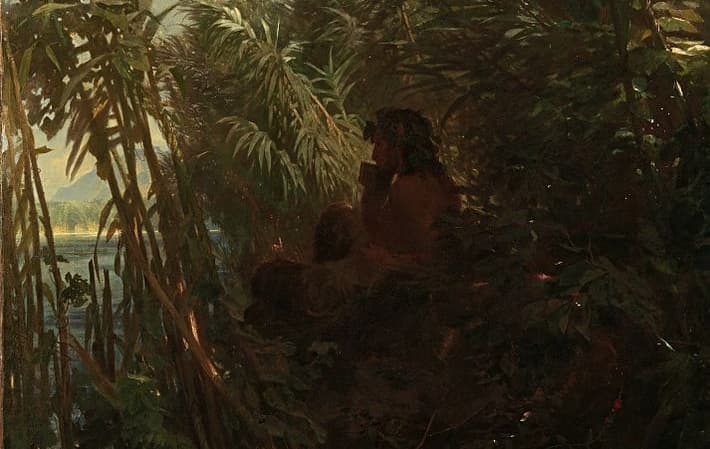Poem of the Day: ‘A Musical Instrument’
Language itself becomes the instrument by which life-giving music is made.

Readers chiefly remember Elizabeth Barrett Browning (1806–1861), whose two hundred seventeenth birthday we mark today, as a Victorian master of the sonnet. Many readers, familiar with her famous “Sonnets from the Portuguese,” might assume that she never wrote anything else. But in fact, her ear for the music of rhyme and meter was versatile and wide-ranging, as evidenced by our commemorative Poem of the Day.
“A Musical Instrument” both tells a story and is, itself, the thing its title suggests. In literary hindsight, the poem’s subject and setting — the Greek god Pan among the reeds of the river — call to mind the magical chapter at the heart of Kenneth Graeme’s “The Wind in the Willows,” when, seeking the lost baby otter, Rat and Mole stumble onto a strange river island and into a vision of glorious transfiguration, in which the god Pan, as the spirit of all wild places, makes himself known to them.
Here, Pan, the god of rustic music, makes a pipe from a water reed. This pipe’s music breathes life into the natural world around it. The poem, meanwhile, creates its own music, driven by incantatory repetitions and a six-line variation of the classic ballad quatrain. The two extra tetrameter lines between the trimeter lines generate a dreamy suspension of the stanza’s forward impulse. Language itself becomes the instrument by which life-giving music is made.
A Musical Instrument
by Elizabeth Barrett Browning
I.
What was he doing, the great god Pan,
Down in the reeds by the river?
Spreading ruin and scattering ban,
Splashing and paddling with hoofs of a goat,
And breaking the golden lilies afloat
With the dragon-fly on the river.
II.
He tore out a reed, the great god Pan,
From the deep cool bed of the river:
The limpid water turbidly ran,
And the broken lilies a-dying lay,
And the dragon-fly had fled away,
Ere he brought it out of the river.
III.
High on the shore sate the great god Pan,
While turbidly flowed the river;
And hacked and hewed as a great god can,
With his hard bleak steel at the patient reed,
Till there was not a sign of a leaf indeed
To prove it fresh from the river.
IV.
He cut it short, did the great god Pan,
(How tall it stood in the river!)
Then drew the pith, like the heart of a man,
Steadily from the outside ring,
And notched the poor dry empty thing
In holes, as he sate by the river.
V.
“This is the way,” laughed the great god Pan,
(Laughed while he sate by the river,)
“The only way, since gods began
To make sweet music, they could succeed.”
Then, dropping his mouth to a hole in the reed,
He blew in power by the river.
VI.
Sweet, sweet, sweet, O Pan!
Piercing sweet by the river!
Blinding sweet, O great god Pan!
The sun on the hill forgot to die,
And the lilies revived, and the dragon-fly
Came back to dream on the river.
VII.
Yet half a beast is the great god Pan,
To laugh as he sits by the river,
Making a poet out of a man :
The true gods sigh for the cost and pain, —
For the reed which grows nevermore again
As a reed with the reeds in the river.
___________________________________________
With “Poem of the Day,” The New York Sun offers a daily portion of verse selected by Joseph Bottum with the help of the North Carolina poet Sally Thomas, the Sun’s associate poetry editor. Tied to the day, or the season, or just individual taste, the poems will be typically drawn from the lesser-known portion of the history of English verse. In the coming months we will be reaching out to contemporary poets for examples of current, primarily formalist work, to show that poetry can still serve as a delight to the ear, an instruction to the mind, and a tonic for the soul.
